| Speakers |
| Andrew Bibby |
 |
Andrew is a Visiting Professor of American Studies at Christopher Newport University. Andrew earned a BA in Political Science and English Literature (Concordia University) and a PhD in Political Science (Michigan State, 2011). In 2011-2012, Andrew was a Senior Research Associate and Postdoctoral Fellow in the James Madison Program in American Ideals and Institutions at Princeton University. He is currently in the process of completing a book project on the political economy of Montesquieu. |
| Deirdre McCloskey |
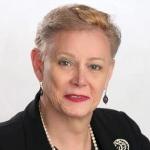 |
Deirdre McCloskey teaches economics, history, English, and communication at the University of Illinois at Chicago. A well-known economist and historian and rhetorician, she has written sixteen books and around 400 scholarly pieces on topics ranging from technical economics and statistics to transgender advocacy and the ethics of the bourgeois virtues. Her latest book, Bourgeois Dignity: Why Economics Can't Explain the Modern World (University of Chicago Press, 2010), is the second in a series of four on The Bourgeois Era. With Stephen Ziliak she wrote in 2008, The Cult of Statistical Significance (2008), which criticizes the proliferation of tests of "significance." She earned her undergraduate and graduate degrees in Economics at Harvard University. Her dissertation on British iron and steel won in 1973 the David A. Wells Prize. |
| John Tomasi |
 |
John Tomasi is Professor of Political Science and Philosophy at Brown University, where he has twice been awarded University prizes for excellence in undergraduate teaching. He is the founding director of the Political Theory Project, an independent research center at Brown that supports scholarship and encourages political dialogue on campus. Tomasi also holds an appointment at the University of Arizona’s Center for the Philosophy of Freedom where he is a University Associate and Research Professor. In addition to numerous scholarly articles, Tomasi is the author of Liberalism Beyond Justice: Citizens, Society and the Boundaries of Political Theory (Princeton University Press, 2001) and Free Market Fairness (Princeton). Free market fairness is a new theory of liberal justice, committed to both limited government and the material betterment of the poor. |
| Pankaj Mishra |
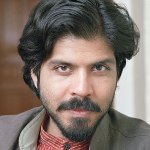 |
Pankaj Mishra graduated with a Bachelor of Commerce from the Allahabad University before completing his MA in English Literature at the Jawaharlal Nehru University in New Delhi. In 1992, he began to contribute literary essays and reviews to The Indian Review of Books, The India Magazine, and the newspaper The Pioneer. His first book was Butter Chicken in Ludhiana: Travels in Small Town India (1995), a travelogue which described the social and cultural changes in India in the new context of globalization. Published in 2012, From the Ruins of Empire: The Revolt Against the West and the Remaking of Asia was shortlisted for the Lionel Gelber prize in Canada, the Orwell Prize in the U.K, and the Asia Society Bernard Schwartz Book Award in the United States. Mishra writes literary and political essays for the New York Times, the New York Review of Books, The Guardian, the New Yorker, London Review of Books, Bloomberg View, among other American, British, and Indian publications. In 2004-2005 he received a fellowship at the Cullman Center for Writers and Scholars, New York Public Library. For 2007-08, he was the Visiting Fellow at the Department of English, University College, London. In 2009, he was nominated a Fellow of the Royal Society of Literature. |
| Pratap Bhanu Mehta |
 |
Pratap Bhanu Mehta is President, Center for Policy Research, New Delhi. He was previously Visiting Professor of Government at Harvard University, Professor of Philosophy, Law and Governance at Jawaharlal Nehru University and a Visiting Professor at NYU Law School. His areas of research include political theory, constitutional law, society and politics in India, governance and political economy and international affairs. He is the recipient of the Malcom S. Adishehshiah Award for 2010 and the Infosys Prize for Social Sciences - Political Science for 2011. He has also done extensive public policy work. He is member of the National Security Advisory Board, Government of India, Member-Convener of the Prime Minister of India’s National Knowledge Commission and has authored a number of papers and reports for leading Government of India and International Agencies, including the World Bank, UNRISD, DfID. He is a prolific columnist. An editorial consultant to the Indian Express, his columns have also appeared in a number of national and international dailies including the Financial Times, Telegraph, International Herald Tribune, The Hindu, Outlook etc. |
| Richard Epstein |
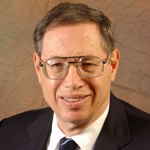 |
Richard Allen Epstein is the Laurence A. Tisch Professor of Law at the New York University School of Law. He is also an Adjunct Scholar at the Cato Institute, the Peter and Kirsten Bedford Senior Fellow at Stanford University's Hoover Institution, the James Parker Hall Distinguished Service Professor of Law Emeritus and Senior Lecturer at the University of Chicago Law School, and a policy advisor for The Heartland Institute. Epstein became a permanent faculty member at NYU School of Law in 2010. Epstein was chosen as one of the most influential legal thinkers of modern times in a poll conducted by the Legal Affairs Magazine. His books include Cases and Materials on Torts (Aspen Law & Business; 10TH ed. 2012) (WITH CATHERINE M. SHARKEY); DESIGN FOR LIBERTY: PRIVATE PROPERTY, PUBLIC ADMINISTRATION AND THE RULE OF LAW (HARVARD 2011)The Case Against the Employee Free Choice Act (Hoover 2009). |
| Steven Lukes |
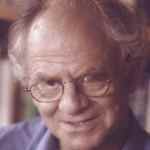 |
Steven Michael Lukes is a political and social theorist. Currently he is a professor of politics and sociology at New York University. He was formerly a fellow in politics and sociology at Balliol College, Oxford. He was then, in turn, a professor of political and social theory at the European University Institute, Florence, of moral philosophy at the University of Siena and of sociology at the London School of Economics. He is the author of numerous books and articles about political and social theory. His first major work was a full-length study of the life and ideas of Emile Durkheim and he retains a keen interest in the Durkheimian tradition in sociology and anthropology. His interests include political sociology, focusing on the study of power; political theory and philosophy; Marxism and other socialist traditions; philosophy of the social sciences; the history of ideas, in particular the political thought of Condorcet; political humour and satire; and, most recently, the sociology of morals, his current preoccupation. Lukes’s best-known, still controversial academic theory is his so-called ‘radical’ view of power. He is a member of the editorial board of the European Journal of Sociology and a fellow of the British Academy. |
| Discussant |
| Gurpreet Mahajan |
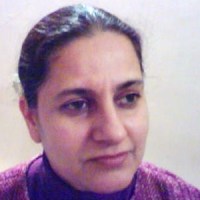 |
Gurpreet Mahajan is Professor of Political Science and Co-ordinator of the DSA (Department of Special Assistance) programme of the Centre for Political Studies, School of Social Sciences. She teaches courses in Philosophy of Social Sciences, Political Thought and Theory, Hermeneutics and Multiculturalism, and has written extensively on issues relating to minorities, cultural diversity, religion and state, secularism, civil society and notions of public and private.
Her publications include Explanation and Understanding in the Human Sciences (OUP 1992; Second Edition 1997; Third Edition 2011), Identities and Rights: Aspects of Liberal Democracy in India (OUP 1998), The Multicultural Path: Issues of Diversity and Discrimination in Democracy (Sage 2002), and India: Political Ideas and the Making of a Democratic Discourse ( Zed Books 2013). She has edited five books and contributed over fifty Articles in professional journals and books. Besides academic publications, she has also written for several newspapers. |
| Neera K. Badhwar |
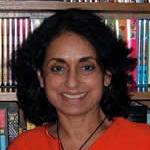 |
Neera Badhwar is Professor Emeritus affiliated with the Department of Philosophy and a Senior Fellow, Philosophy, Politics, & Economics Program, Department of Economics, at the George Mason University. Her Research areas include: Ethics, Moral Psychology and Political Philosophy. Neera is currently working on papers on the ethics of legalizing (or not legalizing) kidney sales, and on the implications (if any) of empirical studies of happiness for public policy. In her forthcoming book, Well-Being: Happiness in an Objectively Worthwhile Life (OUP), she argues that when well-being is understood as the individual’s highest prudential good, it entails not only emotional fulfillment but also objective worth, and that objective worth entails virtue. Hence well-being entails virtue. Her other research interests include International Ethics (on which she has directed two interdisciplinary conferences and published one paper), and the role of markets in promoting civic friendship and civility. |
| Peter McNamara |
 |
Dr. Peter McNamara teaches political theory. He specializes in early modern and American political thought. He is the author of Political Economy and Statesmanship: Smith, Hamilton and the Foundation of the Commercial Republic and the editor of The Noblest Minds: Fame, Honor and the American Founding, and, most recently (with Louis Hunt), Liberalism, Conservatism and Hayek's Idea of Spontaneous Order. His current research projects include essays on Jefferson on federalism and Franklin on religion and a book on “Liberalism and the Problem of Human Nature”. In the Fall of 2008 he was the Hayek Visiting Scholar at the Clemson Institute for the Study of Capitalism at Clemson University, South Carolina. |
| Rajshree Chandra |
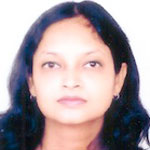 |
Rajshree Chandra is an associate professor of Political Science at the University of Delhi. Currently, she is a Post Doctoral Fellow at the Center Policy Research (New Delhi). Her research interests include intellectual property rights, their normative claim as a right, their intersections with health rights, collective claims of indigenous communities, and famers’ rights. Her current project focuses on contemporary articulations of biocultural entitlements – farmers’ rights and benefit sharing entitlements. The current work seeks to build upon her earlier published monograph titled "Knowledge as Property: Issues in the Moral Grounding of Intellectual Property Rights". |
| Tom Palmer |
 |
Tom G. Palmer is presently Vice President for International Programs at the Atlas Economic Research Foundation, General Director of the Atlas Global Initiative for Free Trade, Peace, and Prosperity, a Senior Fellow at the Cato Institute, and Director of Cato University. In addition to his work at Atlas and Cato, he has served on several board of trustees and currently serves on active advisory boards of a number of other organizations. He travels a great deal and lectures on the history of liberty and constitutionalism, free trade and peace, individualism, public choice economics, and the moral and legal foundations of individual rights. His book Realizing Freedom: Libertarian Theory, History, and Practice contains some of his writings on economics, history, political theory, jurisprudence, moral philosophy, and politics and strategy. He received his BA from St. Johns College, MD, his MA in philosophy from The Catholic University of America, and his doctorate from Oxford University. |
| Chairs |
| Christopher Lingle |
 |
Christopher Lingle is Visiting Professor of Economics at Universidad Francisco Marroquín in Guatemala, Adjunct Scholar at the Centre for Independent Studies (Sydney), Research Scholar at the Centre for Civil Society (New Delhi), and Member of the Academic Advisory Council of the Globalization Institute (Brussels). His research interests are in the areas of Political Economy and International Economics that focuses on emerging market economies and public policy reform in Europe, East Asia, Latin America and Southern Africa. His work has appeared as chapters in books, the international media, and scholarly journals, including the American Economic Review, Foreign Affairs, Journal for Studies in Economics and Econometrics, Kyklos, and Pacific Review. His book on the political economy of Singapore’s development was entitled, Singapore’s Authoritarian Capitalism: Asian Values, Free Market Illusions, and Political Dependency. He is widely credited with anticipating the turmoil in the East Asian economies that began in 1997 (The Rise and Decline of the ‘Asian Century’: False Starts on the Road to the ‘Global Millennium’). He earned his doctorate in economics from the University of Georgia in 1977. |
| Gurcharan Das |
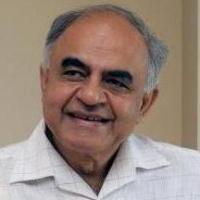 |
Gurcharan Das is a world-renowned author, commentator, public intellectual and the former CEO of Procter & Gamble India. In 1995, after a 30-year career in six countries, he took an early retirement to become a full time writer, and speaker who, in addition to authoring a regular column for The Times of India is a contributor to The Financial Times, Wall Street Journal, Foreign Affairs, and New York Times. Business Week described Das’ international bestseller, India Unbound : The Social and Economic Revolution from Independence to the Global Information Age, as “one of the most readable and insightful books to appear on India’s tortuous economic path in its 54 years since shaking off British rule.” Published in 2002, it is currently in 17 languages and the subject of a popular BBC documentary. A frequent commentator for CNN, BBC, and PBS including a guest of Charlie Rose and Tim Sebastian. He has recently published a new book, India Grows at Night: A liberal case for a strong state (Penguin 2012). He is also general editor for a 15 volume series, The Story of Indian Business (Penguin) of which three volumes have already appeared. |
| Parth J Shah |
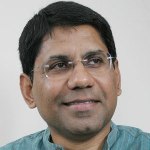 |
Parth J Shah is Founder-President of Centre for Civil Society, an independent, non-profit think tank in New Delhi. CCS offers public policy solutions within the framework of the individual rights, freedom of exchange, rule of law, and limited government. It is currently focused on education reforms through the School Choice Campaign: Fund Students, Not Schools! and on livelihood deregulation through the Law, Liberty, & Livelihood Campaign and Jeevika Documentary Festival. Parth previously taught economics at the University of Michigan before returning to India to start CCS in 1997. He has published academic articles and edited several books in the areas of development economics, welfare economics, business-cycle theory, free or laissez-faire banking, and currency-board systems. He holds a PhD in economics from Auburn University, USA. |
| Shikha Dalmia |
 |
Shikha Dalmia is a senior policy analyst at Reason Foundation, a nonprofit think tank advancing free minds and free markets. Dalmia is a Bloomberg View contributor, a columnist at the Washington Examiner, and writes regularly for Reason magazine. She is also a frequent contributor to the op-ed pages of The Wall Street Journal and numerous other publications such as the Los Angeles Times, New York Post, The Weekly Standard, Business Week, San Francisco Chronicle, and the Chicago Tribune. She previously served as a columnist for Forbes. Dalmia was co-winner of the first 2009 Bastiat Prize for Online Journalism for her columns in Forbes and Reason.
From 1996 to 2004, Dalmia was as an award-winning editorial writer at the Detroit News, covering a variety of policy issues, including the environment, immigration, Social Security, welfare reform, health care and foreign policy. She also worked as a reporter for the Patriot, a national daily newspaper based in New Delhi, India, where she grew up and earned her B.S. degree in chemistry and biology from the University of Delhi. Dalmia frequenlty appears on Fox Business Network and other television and radio outlets. Dalmia, who taught news writing courses at Michigan State University, earned a Master's degree in mass communication from Louisiana State University. She also holds a post graduate diploma in journalism from the Indian Institute of Mass Communications. |
| Organisers |
| Arthur Melzer |
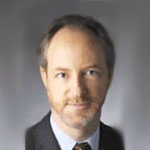 |
Arthur Melzer is a Professor specializing in political thought at the department of Political Science at Michigan State University. He is also a co-founder and co-director of the Symposium on Science, Reason, and Modern Democracy, an independent research center housed in the Department, which is dedicated to the study of the theory and practice of modern democracy. From 1992-94, Prof. Melzer was a visiting professor and visiting scholar at Harvard University. He received his B.A. from Cornell University in 1971 and his Ph.D. from Harvard University in 1978. His dissertation won the Toppan Prize from Harvard’s Government Department and the Strauss Prize from the American Political Science Association. He is a winner of the MSU Social Science Alumni Outstanding Teaching Award. His writings include The Natural Goodness of Man: On the System of Rousseau's Thought (University of Chicago Press, 1990), “Esotericism and the Critique of Historicism” (American Political Science Review, May 2006) and many more. He is also the co-editor of eight volumes of essays on various themes in political philosophy, including The Problem of Technology in the Western Tradition (Cornell University Press, 1993) and Multiculturalism and American Democracy (University of Kansas Press, 1998). |
| Baishali Bomjan |
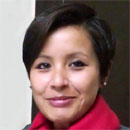 |
Baishali heads Centre for Civil Society's Academy which conducts all educational and outreach programs of the Centre. She has designed and managed several international and national programs, certificate courses for journalists and edited several publications of the Centre. She is also Atlas Economic Research Foundation's representative for Asia and leads the Asia Centre for Enterprise that will assist Atlas in discovering, assessing, and training talented young people, and inspiring them to devote their careers to advancing liberty in their home country or region.
Having worked extensively in both the development sector and the print media in Nepal and India, her work profile includes serving as the Director of Nuns Welfare Foundation of Nepal, Editor of Spark (corporate magazine) and Assistant Editor of the boss and VOW (Voice of Women), Nepal's leading business and women's magazines respectively. She holds an MSc in Zoology from the University of North Bengal, India, Think Tank MBA from Atlas and is especially interested in project incubation, strategic planning and communications. |
| Jerry Weinberger |
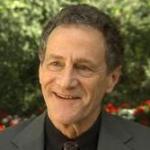 |
Jerry Weinberger is University Distinguished Professor of Political Science at Michigan State University. From 1997 until 2001 he was Chair of the Department of Political Science. He received his B.A. from The University of California at Berkeley in 1967 and his Ph.D. from Harvard University in 1973. He has won the Michigan State University Teacher-Scholar Award, fellowships from the Earhart Foundation and the Institute for Educational Affairs, and has twice been a Senior Research Fellow of the National Endowment for the Humanities. In 2007, he won the Michigan State University Distinguished Faculty Award. Professor Weinberger has pursued a career-long interest in the relation between modern politics and the rise of modern science and technology. He has written extensively on the seventeenth century philosopher and statesman Sir Francis Bacon and more recently has lectured and written on the emerging subject of biotechnology. Among his books and scholarly articles are Science, Faith and Politics: Francis Bacon and the Utopian Roots of the Modern Age (Cornell University Press, 1985); "Politics and the Problem of Technology: An Essay on Heidegger and the Tradition of Political Philosophy" (American Political Science Review, March 1992); "Pious Princes and Red-Hot Lovers: The Politics of Shakespeare's Romeo and Juliet" (The Journal of Politics, 2003). His latest book is Benjamin Franklin Unmasked: On the Unity of His Moral, Religious, and Political Thought (The University Press of Kansas, 2005, 2008). He also writes occasionally for City Journal. |
| Richard Zinman |
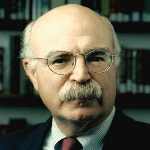 |
Professor Zinman studies political philosophy and American political thought. He has taught in the college since 1969. Since 1989, he has also served as executive director of the Symposium on Science, Reason, and Modern Democracy, a research center in the Department of Political Science. He has edited and contributed to seven volumes of essays published by the Symposium: Technology in the Western Political Tradition (1993), History and the Idea of Progress (1995), Multiculturalism and American Democracy (1998), Democracy and the Arts (1999), Politics at the Turn of the Century (2001), The Public Intellectual: Between Philosophy and Politics (2003), and Christopher Hitchens, Thomas Jefferson: Author of America (2005). In 2005, the Symposium received a $500,000 challenge grant from the National Endowment for the Humanities, the first such grant awarded to Michigan State University. Professor Zinman has received the State of Michigan Teaching Excellence Award (1991), the MSU Distinguished Faculty Award (1995), and the Honors College Award for Distinguished Contributions to Honors Students (2005). |
| Steven Kautz |
 |
Steven Kautz is an Associate Professor in the Department of Political Science at Michigan State University. He has been at MSU since 2000. Before coming to MSU, he taught in the Department of Political Science at Emory University from 1988-1999. Kautz received a B.A. from James Madison College at Michigan State University in 1981 and a Ph.D. from the Committee on Social Thought at the University of Chicago in 1989.Kautz is the author of Liberalism and Community (Cornell University Press), a defense of classical liberalism against contemporary communitarian critics of liberalism. He continues to write about the political theory of classical liberalism, including essays on toleration, privacy, the rule of law, and the place of liberal education in a liberal society. He is at work on a book on democratic citizenship and the culture wars. More recently, Kautz has also been working on a book on the political thought of Abraham Lincoln, focusing on problems of democratic statesmanship. Kautz teaches courses on American political thought, modern political philosophy, liberalism and American constitutional law, and comparative constitutionalism. |
|























